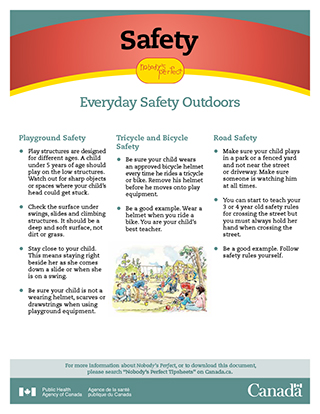Safety: Everyday Safety Outdoors
Playground Safety
- Play structures are designed for different ages. A child under 5 years of age should play on the low structures. Watch out for sharp objects or spaces where your child's head could get stuck.
- Check the surface under swings, slides and climbing structures. It should be a deep and soft surface, not dirt or grass.
- Stay close to your child. This means staying right beside her as she comes down a slide or when she is on a swing.
- Be sure your child is not a wearing helmet, scarves or drawstrings when using playground equipment.
Tricycle and Bicycle Safety
- Be sure your child wears an approved bicycle helmet every time he rides a tricycle or bike. Remove his helmet before he moves onto play equipment.
- Be a good example. Wear a helmet when you ride a bike. You are your child's best teacher.
Road Safety
- Make sure your child plays in a park or a fenced yard and not near the street or driveway. Make sure someone is watching him at all times.
- You can start to teach your 3 or 4 year old safety rules for crossing the street but you must always hold her hand when crossing the street.
- Be a good example. Follow safety rules yourself.
Fun & Easy Activities
Games to Teach Safety Rules
Safety Rule Rhymes
You can make up songs about traffic safety and sing them to a familiar tune. This is an easy and fun way to help your child remember the rules. Here are two examples you can sing to the tune of "Frère Jacques."

Download the alternative format
(PDF format, 1.3 MB, 2 page)
Organization: Public Health Agency of Canada
Yellow light means wait.
Yellow light means wait.
Red means stop.
Red means stop.
When the light is green,
Then we can cross,
Holding hands, holding hands.At the corner.
At the corner.
We look left.
Then we look right.
We look left again,
Then we can cross,
Holding hands, holding hands.
Freeze and Unfreeze
Sometimes it is hard for a child to stop moving when you want him to. Make a game out of stopping and starting when you say the special words. Practise first at home by walking around the room together. When you say "freeze!" you and your child stop and pretend to be frozen statues. When you say "unfreeze" you can both start moving again.
In the game, your child will learn to react quickly. Then you can use the word "freeze" to tell him to stop when you are walking outside. It is easier to obey the rules when your child feels he is playing a game.
Program providers: Please use this space to input your organization's information.